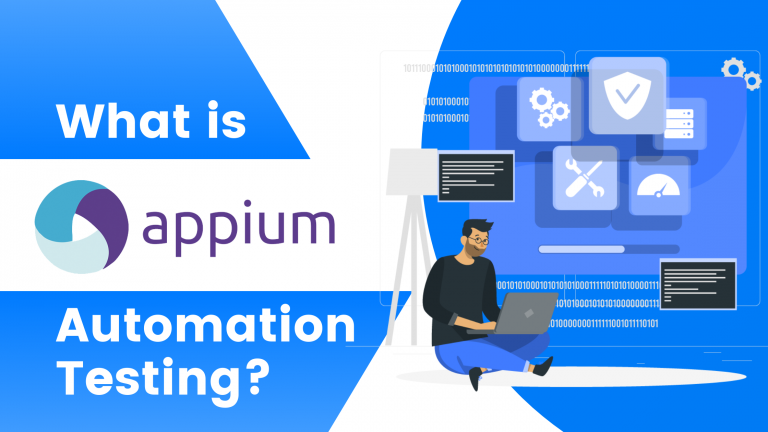Appium is an effective open-source solution for automation testing of native, hybrid, and online apps. The ability to create test cases for iOS and Android using a single API is primarily made possible by Appium’s cross-platform nature. In essence, Appium draws its value from Selenium and, with the help of Selenium’s WebDriver, actively interacts with iOS and Android apps using JSON Wire Protocol.
According to its server-client architecture, a web server using a REST API connects directly to the client, receives commands, and executes them on a specific mobile device. Since Appium is a Node js-based HTTP server, inspecting the results of running a particular command is easy. Saving the time and effort required to recompile the app for automation is one crucial benefit of Appium mobile testing. Appium extensively uses the Selenium WebDriver, and this tool enhances its API in addition to specific methods of testing mobile applications.
Table of Contents
How Does Appium Work?
Appium is an “HTTP Server” created with the Node.js programming language. Through the use of the Webdriver JSON wire protocol, it can power iOS and Android sessions. You must install Node.js on the computer before starting the Appium Server.
Appium sets up on the machine that exposes a REST API as soon as it gets downloaded and correctly installed. Its function is to connect to the client and take connection requests for commands to be executed over mobile devices. As a result, it responds using HTTP responses. Additionally, the user interface of the concerned apps that the mobile test automation framework operates carries out this request once more.
Why Appium?
With the hype it generates in the enterprise mobility space, mobility teams continue looking for effective solutions to automate testing using Appium. Appium is the ideal tool for automating native, mobile web, and hybrid apps on their respective platforms because it is open source.
Here are the main reasons why mobile app automation testing using Appium is the best option for you:
Use of Standard API
Appium is well-liked because it uses the standard API on all platforms, eliminating the need to modify or recompile your app’s code. Creating tests for the iOS and Android platforms using the same API is simple with Appium. But since the UI elements differ across iOS and Android, you will still require different scripts for each device.
Use Any Webdriver-Compatible Language
Writing and running tests with Appium frees you from being restricted to a specific language or framework. You can write the tests in any Selenium WebDriver compatible language, including Java, PHP, C#, Python, Ruby, and Javascript with Node.js.
Choosing a Testing Framework
Appium allows mobility teams the freedom to choose a testing framework. Previously, you could write Java-based tests only using the UI Automator of Google, while for tests written in Javascript, you could write using the UI Automation of the library for Apple. Appium significantly changed this situation.
Cross-Platform Test Automation
Appium is the most excellent cross-platform mobile app test automation solution because it can run tests on Android and iOS devices. Appium uses the JSON wire protocol to communicate with Android and iOS devices using Selenium WebDriver. To automate iOS apps, Appium uses the libraries made available by Apple with the aid of a program called Instruments. After iOS 9.3, the Instruments API was considered obsolete and replaced by the XCUITest framework in later operating system releases.
Similar techniques are at work in Android, where Appium uses a proxy to send the automation command to the UIAutomator test case that is now running on the device. UIAutomator, a native framework for UI automation on Android, enables the execution of JUnit test cases straight from the command line into the device.
Open Source
Appium’s status as an open source testing framework, which allows testing on real devices, emulators, simulators, and, of course, native, hybrid, and web applications for iOS and Android, is one of its main advantages. It is simpler for new automation engineers to get their questions answered thanks to Appium’s sizable and vibrant open community.
Mobile Device Cloud With Build-In Appium
Teams just starting with automation or considering mobile testing Appium as a possible option can look into a mobile device cloud with built-in Appium as an alternative.
In addition to helping with device management and sharing, a mobile device cloud also facilitates continuous delivery and automated testing procedures. Teams may quickly start with automation and scale up later using a mobile device cloud with integrated Appium. Additionally, it will act as an additional buffer against any difficulties encountered while using an open-source test platform. Here are some advantages of a mobile device cloud having built-in Appium support:
- Supports multiple device parallel testing
- Takes test framework complexity into account
- Developing Appium scripts is now simple
- Optimizes the CI/CD procedure
Conclusion
As we’ve seen, Appium has grown to command a considerable portion of the market for mobile test automation. Appium testing is perfect for Android, iOS, and its OS versions because many options are available. Creating Appium tests is simple and may be done in various ways, according to app developers and testers combined.
Appium test automation solutions are a wise choice for your projects. The only approach to guarantee a successful Appium integration is to get assistance from reliable mobile app testing services; HeadSpin is one such tool.
Jonathan Lipps is the Director of Automation Technologies at HeadSpin and project leader for the Appium Mobile Automation Platform.
We are making the most of Appium with his assistance.

